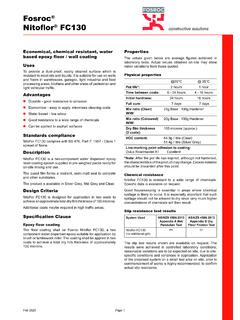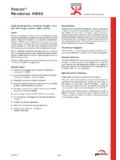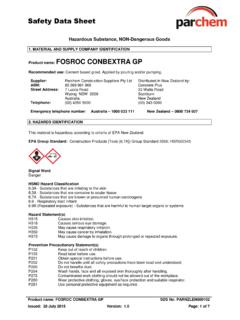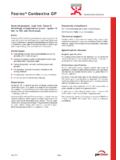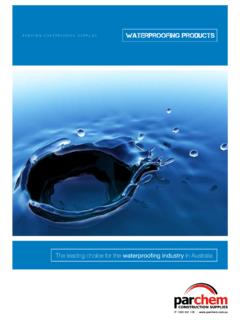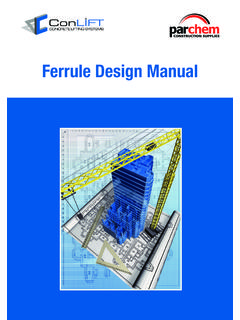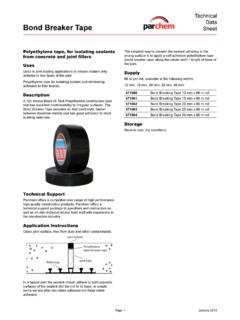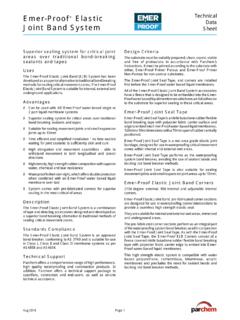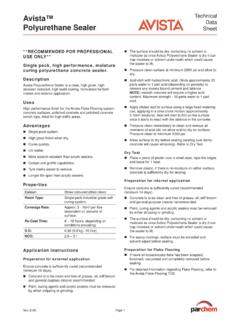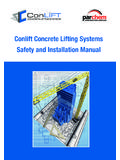Transcription of Fosroc Patchroc C constructive solutions - Parchem
1 Page 1 Oct 2017constructive solutionsFosroc Patchroc CFloor / pavement patch repair, fast set mortar (25-200 mm depth)UsesFor the emergency reinstatement of localised deep patches in concrete pavements, airport aprons, access ramps, roadways and many industrial situations such as gangways and warehouse floors. Patchroc C is particularly useful where interruption to traffic must be minimised. The product is alkaline in nature and will protect embedded steel reinforcement. It may be used internally and the reinstatement of large areas of concrete pavements and floors, the use of Paveroc is Rapid strength gain - will accept traffic in 2 - 4 hours High strength, abrasion and weather resistance Single component product eliminates site batching and requires only the site addition of clean water Excellent bond to the concrete substrate Shrinkage compensated Suitable for patches up to 200 mm deepDescriptionPatchroc C is supplied as a ready to use blend of dry powders which requires only the site addition of clean water to produce a highly consistent, high strength patch repair mortar which virtually self-compacts.
2 The material is based on a blend of cements, graded aggregates, special fillers and chemical additives to provide a mortar with good handling characteristics, while minimising water demand. Patchroc C exhibits excellent thermal compatibility with concrete and good water repellent properties. The low water requirement ensures fast strength gain and long-term SupportParchem offers a comprehensive range of high performance, high quality concrete repair and construction products. In addition, the company offers a technical support service to specifiers, end-users and contractors, as well as on-site technical CriteriaPatchroc C is designed for horizontal use. The material should not be applied at less than 25 mm thickness. Patchroc C may be applied up to a maximum thickness of 200 mm. The maximum volume in any single pour should be limited to 50 litres. PropertiesThe following results were obtained at 23 strength (MPa)Consistency2hrs4hrs1 Day7 Days28 DaysStiff Trowellable2532405060 Plastic Trowellable2328354555 Flowable1825334050 Working life:25 - 30 mins @ 23 C (Remixing can occur up to 15 mins without any adverse effects)Setting time:Initial set:Final set:35 - 50 mins @ 23 C45 - 60 mins @ 23 CTraffic time: Pedestrian/Vehicular:2 - 4 hours @ 23 CFresh wet density:Approximately 2300 kg/m3 dependent on actual consistency InstructionsPreparationSaw cut or cut back the extremities of the repair locations to a depth of at least 20 mm to avoid feather-edging and to provide a square edge.
3 Break out the complete repair area to a minimum depth of 25 mm up to the sawn the surface and remove any dust, unsound or contaminated material, plaster, oil, paint, grease, corrosion deposits or algae. Where breaking out is not required, roughen the surface and remove any laitance by light scabbling or grit-blasting. Oil and grease deposits should be removed by steam cleaning, detergent scrubbing or the use of a proprietary degreaser. The effectiveness of decontamination should then be assessed by a pull-off fully any corroded steel in the repair area and remove all loose scale and corrosion deposits. Steel should be cleaned to a bright condition paying particular attention to the back of exposed steel bars. Grit-blasting is recommended for this corrosion has occurred due to the presence of chlorides, the steel should be high pressure washed with clean water immediately after grit-blasting to remove corrosion products from pits and imperfections within its prepared area should be blown clean with oil-free compressed steel primingApply one full coat of Nitoprime Zincrich to all exposed reinforcing steel and allow to dry before continuing.
4 If any doubt exists about having achieved an unbroken coating, a second application should be made and, again, allowed to dry before 2constructive solutionsFosroc Patchroc CSubstrate primingThe substrate should be thoroughly soaked with clean water and any excess removed prior to applying one coat of Nitobond AR or diluted Nitoprime 330 (4:1 with water) and scrubbing it well into the surface. Patchroc C should be applied to the primed concrete as soon as the primer has become tacky. If the primer dries out, a fresh coat of primer should be applied, allowed to become tacky, then the Patchroc C applied should be taken to ensure that Patchroc C is thoroughly mixed. A forced-action mixer is essential. Mixing at a slow speed (400/500 rpm) in a suitably sized drum using appropriate equipment such the Ransom 140 x 600 M14 Helical mixing paddle (product code: N4020892-UNIT) fitted to a heavy-duty 1600W mixer, such as Ransom 1602 E (product code: NP7EV160-UNIT) or equivalent is acceptable for one-bag mixes.
5 Free fall mixers must not be used. It is recommended that only one bag of Patchroc C is mixed at any one time to ensure that all the mortar can be placed within its working life. Place correct amount of drinking quality water into the mixer and, with the machine in operation, add one full 20 kg bag of Patchroc C and mix for 3 minutes until fully homogeneous. Do not mix for longer than this time to ensure that the available working life is not reduced. Note that powder must always be added to Addition(Litres)Yield(Litres)Stiff part bagsIt is recommended that full bags be mixed, however for applications where smaller quantities of product are required, experienced applicators may elect to mix half bags by weighing out (the correct quantity of product) and mixing with half the recommended quantity of water. In doing so the contractor accepts the risk of any off-ratio mixing. Agitate the dry product before weighing out to minimise any segregation.
6 Reliable scales should be used to weigh out individual the mixed Patchroc C on to the primed substrate as soon as possible after mixing. The mortar should be applied evenly by trowel and tamped in place with a wood float to ensure full compaction. Thoroughly compact the mortar around any exposed steel reinforcement. Patchroc C can be applied up to 200 mm thickness in single applications. Note: the minimum applied thickness of Patchroc C is 25 sections greater than 200 mm thickness can be achieved by application of multiple layers. In this instance, the surface of the intermediate layers should be scratch-keyed and allowed to set for a minimum of 2 hours before continuing. Repriming with Nitobond AR or Nitoprime 330 and a further application of Patchroc C may proceed at this C should be struck off to the correct level and finished with a steel trowel to fully close the surface. If a textured surface is required, this can be achieved using a suitable roller or brush.
7 The completed surface should not be temperature workingIn cold conditions down to 5 C, the use of warm water (up to 30 C) is advisable to accelerate strength development. Normal precautions for winter working with cementitious materials should then be adopted. The material should not be applied when the substrate and/or air temperature is 5 C and falling. At 5 C static temperature or at 5 C and rising, the application may temperature workingAt ambient temperatures above 35 C, the material should not be used as premature setting may C is a cement-based repair mortar. In common with all cementitious materials, Patchroc C must be cured immediately after finishing in accordance with good concrete practice. The use of Nitobond AR or a suitable Concure curing compound, sprayed on to the surface of the finished mortar in a continuous film, is recommended. In fast drying conditions, supplementary curing with polythene sheeting taped down at the edges must be used.
8 In cold conditions, the finished repair must be protected from with protective finishesPatchroc C is extremely durable and will provide an excellent hard wearing surface to the repaired locations. Surrounding floor areas may benefit from the application of an abrasion or chemical-resistant protective coating. For internal locations, Parchem recommend the use of the Nitoflor range of floor coatings. These products provide a decorative and uniform appearance as well as protecting areas of the floor which might otherwise be at risk. Nitoflor products may be applied over the repair area after prior removal of the curing membrane generally after 3 days. Your local Parchem sales office should be contacted for advice about external protective AR, Nitoprime 330 and Patchroc C should be removed from tools, equipment and mixers with clean water immediately after use. Cured material can only be removed used with Nitoprime Zincrich should be cleaned with FosrocSolvent 10.
9 Page 3 Important noticeA Safety Data Sheet (SDS) and Technical Data Sheet (TDS) are available from the Parchem website or upon request from the nearest Parchem sales office. Read the SDS and TDS carefully prior to use as application or performance data may change from time to time. In emergency, contact any Poisons Information Centre (phone 13 11 26 within Australia) or a doctor for disclaimerThis Technical Data Sheet (TDS) summarises our best knowledge of the product, including how to use and apply the product based on the information available at the time. You should read this TDS carefully and consider the information in the context of how the product will be used, including in conjunction with any other product and the type of surfaces to, and the manner in which, the product will be applied. Our responsibility for products sold is subject to our standard terms and conditions of sale. Parchem does not accept any liability either directly or indirectly for any losses suffered in connection with the use or application of the product whether or not in accordance with any advice, specification, recommendation or information given by it.
10 *Manufactured and sold under license from Fosroc International Limited. Fosroc and the Fosroc logo are trade marks of Fosroc International Limited, used under license. Parchem Construction Supplies Pty Ltd7 Lucca Road, Wyong NSW 2259 Phone: 1300 737 80 069 961 968 Distributed in New Zealand by: Concrete Plus Ltd23 Watts Rd, Sockburn 8042 Ph: 0800 657 156constructive solutionsLimitationsPatchroc C should not be used when the temperature is below 5 C and falling. Patchroc C should not be used when temperature is above 35 C. Do not mix part bags. The product should not be exposed to moving water during application. Exposure to heavy rainfall prior to the final set may result in surface scour. If any doubts arise concerning temperature or substrate conditions, consult your local Parchem sales C 20 kg:FC342060-20 KGNitoprime Zincrich 1 litre:FC022100-1 LNitobond AR 1 litre:FC520016-1 LNitobond AR 5 litre:FC520016-5 LNitobond AR 20 litre:FC520016-20 LNitoprime 330 1 litre: FC605120-1 LNitoprime 330 5 litre:FC605120-5 LNitoprime 330 20 litre:FC605120-20 LFosroc Solvent 10:4 and 20 litre cansCoverage and yieldPatchroc C:Approximately litres/20 kg bag ( m at 25 mm thickness)Nitoprime Zincrich:7 m /litre (approx.)
